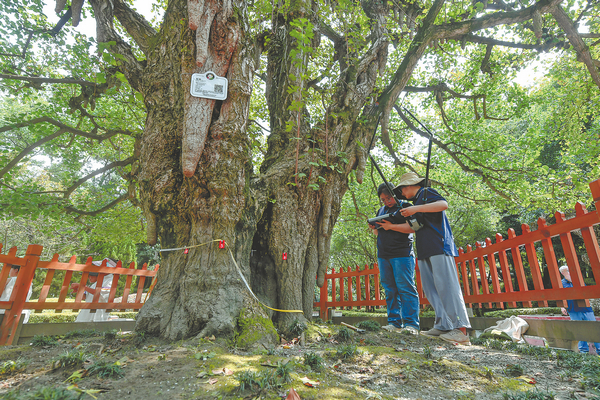

CHENGDU — Armed with advanced diagnostic tools, a team of "tree doctors" navigates through bustling crowds in a park to reach its latest patient — a venerable ginkgo tree that has stood the test of time for over 1,700 years.
The team begins meticulously examining the tree as part of a citywide initiative aimed at assessing the health of ancient and famous trees and establishing health records for these natural treasures in Chengdu, the capital of Southwest China's Sichuan province.
Liu Fangling, a plant pathology expert on the team, uses a sonic tomograph to detect internal decay inside the tree.
"It's similar to a human CT scan," she explains. "With the help of specialized software, we can visualize the condition inside the trunk and estimate the extent of the decay."
Meanwhile, Gou Yubo, another "doctor", applies a light detection and ranging, or LiDAR, scanner to create a 3D model of the tree to record its vital data, such as height, crown width and trunk diameter.
Then, soil samples and leaf specimens are collected for further laboratory analysis.
"Using technology and equipment, we conduct comprehensive diagnostics to identify issues, such as pest infestation, soil compaction and nutrient deficiencies, providing a basis for precise intervention," says Gou.
Within half an hour, the health check is complete — a routine part of the team's fieldwork. On average, they can inspect at least four to five trees each day.
Known as the hometown of giant pandas, Chengdu also boasts over 9,400 ancient and famous trees scattered across diverse locations from residential areas and village courtyards to remote mountain fields.
Ancient trees are more susceptible to health issues such as trunk decay, crown dieback, pest infestation and disease.
To enhance the protection of these natural treasures, the Chengdu Botanical Garden formed the ancient tree doctor team in 2014. Since then, the team has conducted health assessments on more than 5,000 ancient trees throughout the city.
However, conducting health checks on them is a tall order. The team frequently encounters hazards like insects and snakes in remote areas. But the biggest challenge is often just locating the trees.
Gou recalls a particularly challenging mission in Dayi county where the team had to carry its equipment on foot along a rugged mountain path for over an hour to reach a single tree. Some trees are hidden away in abandoned schoolyards, while others cling to cliff sides with no accessible paths, making their preservation efforts all the more demanding.
Despite hardships, the work is immensely rewarding.
In 2017, the team members diagnosed a severely decayed ginkgo tree in another park in Chengdu. They recommended targeted treatments like removing parasitic plants, revitalizing the root system and applying waterproof and insect-proof treatments.
"By 2022, the once-dying tree had flourished, with lush, green foliage," Liu says, beaming.
A 2022 survey recorded over 5.08 million ancient and famous trees in China.
Chengdu's efforts to protect these natural treasures are part of a nationwide movement to preserve botanical heritage. In recent years, initiatives to safeguard these living relics have gained momentum, in line with the country's broader goals of sustainable development and environmental conservation.
Last year, a big data platform to manage ancient and famous trees was launched in Huangling county, Northwest China's Shaanxi province. Meanwhile, in East China's Jiangsu province, authorities aim to achieve a protection rate of over 98 percent for ancient and famous trees with archive cards by next year.
"Ancient and famous trees are priceless legacies of nature and our ancestors. It is our responsibility to protect them," Gou says.
Xinhua